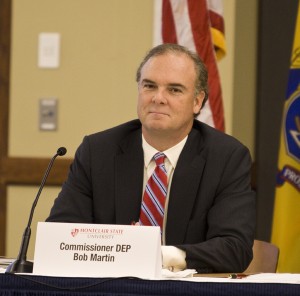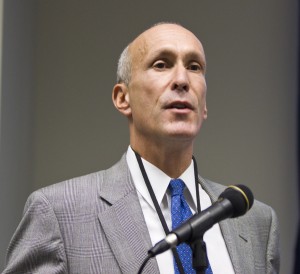Is Bob Martin Sabotaging The Highlands Septic Density Standard?
The key protection of the Highlands Region’s water and land resources may about to be sabotaged – quietly – by DEP Commissioner Bob Martin.

DEP Commissioner Bob Martin – at March 23 Red Tape Review Group hearing
[Update: 7/6/10 – it only took the Morris Daily Record a few months to write the story today:
NJ is re-evaluating strict septic rules that angered Highlands Act landowners ~~~ end update]
To protect the groundwater drinking water resources of the Highlands Region from pollution, DEP adopted regulations (see Highlands Rule) that, among other things, restrict the density of septic systems in the core Preservation Area (in July 2008, I wrote about that rule).
In the sensitive Highlands Preservation Area, the DEP septic standard allows one home per 88 acres in forested lands, and one per 25 acres on farmland. This is the most restrictive standard in New Jersey.
Large land areas are needed to dilute septic pollution due to the geology of the Highlands region, where very little of the rainfall seeps into the ground and “recharges” drinking water aquifers. Here is DEP’s basis for the standard: (for complete technical basis, see: NJDEP-Highlands-Basis & Background of Septic Density Standard)
The HWPPA at N.J.S.A.13:20-32(e) directs that a septic system density standard must be established at a level to prevent the degradation of water quality, or to require the restoration of water quality, and to protect ecological uses from individual, secondary, and cumulative impacts, in consideration of deep aquifer recharge available for dilution. The septic system density standard was to be established in consideration of the antidegradation provisions of both the Surface Water Quality Standards (SWQS) at N.J.A.C. 7:9B-1.5(d)6(iii), and Stormwater Management rules at N.J.A.C. 7:8-5.5(h), that are applicable to Category One waters, and are to be applied to all Highlands open waters pursuant to subsection g. of section 34 of P.L.2004, c.120 (C.13:20-32). The Surface Water Quality Standards rules at N.J.A.C. 7:9B-1.5(d)6.iii. state that Category One Waters shall be protected from any measurable changes (including calculable or predicted changes) to the existing water quality. The Stormwater Management rules at N.J.A.C. 7:8-5.5(h) require the preservation of a 300-foot special water resource protection area (SWRPA) along all Category One waters.

Does that look like a farmhouse to you? Farm Bureau building in Trenton – just another fat cat lobbying outfit living high on the hog while feeding at the trough of taxpayer subsidies. Does the typical real NJ farmer live like this?
The NJ Farm Bureau has sued DEP to block that rule. They lost the initial round, the DEP rules were upheld, and their appeal case is now in the Appellate Division.
Legal briefs have been filed and the arguments were scheduled to be presented to a three-judge panel on March 9 in Trenton. But according to a NJ Farm Bureau Op-Ed in yesterday’s NJNewsroom.com:
We are greatly encouraged by acting DEP Commissioner Robert Martin’s decision last week to obtain a six-month delay in the legal challenge on the septic density rule to take “a fresh look” at the standard.
This is extremely disturbing – Martin’s “fresh look” is very likely to gut the most protective standard in the Highlands .
The DEP’s rules were held scientifically and legally valid by Administrative Law Judge Metzger’s thorough decision of March 24, 2009. ALJ Metzger’s opinion was adopted by the DEP on July 13, 2009.
Commissioner Martin should be SUPPORTING the decisions of ALJ Metzger and his predecessor and PROTECTING the Highlands, not taking a “fresh look” which is little more than a cynical euphemism for rollback and sell out to development interests.
The Christie Transition Team recommendations basically call for the abolition of DEP regulations in the Highlands region and full delegation to the Highlands Council. Martin’s “fresh look” would be a back door way to advance such a wrecking ball agenda and in one stroke take out the core protections of DEP regulations and the Council’s Regional Master Plan, which by law is based on and must be at least as protective as DEP standards.
Any move by Martin in this direction must be stopped – and nipped in the bud NOW.
(full disclosure: I was the architect of the DEP elements of the Highlands legislation, I wrote the “deep aquifer recharge” provision in the law that drives the density standard, and worked on the development of the regulatory standard while at DEP. After leaving DEP, I later worked as a consultant for the Highlands Coalition in meeting with DEP on the Highlands regulations. So, for once, the revolving door revolved to the benefit of the public interest).
[Update: below is the typical BS we see from the Farm Bureau –
It seems like the Warren County Planning Board doesn’t know that we’re in a deep recession and the housing bubble and financial crisis are what have caused the “70% decline in economic activity” they report. If such a decline were caused by “additional environmental regulations enacted by state agencies” it would be limited to NJ and worst in the Highlands. But that simply is not the case – we are in a global and national economic recession – furthermore, thousands of DEP permits/approvals have been issued to thousands of projects that have not been built. That’s why the Legislature passed the Permit Extension Act.
There are a GLUT of environmental approvals, a GLUT of vacant commercial office space, thousands of vacant foreclosed homes, housing prices are dropping, and new construction is stalled. Environmental regulations are not slowing economic activity, lack of demand, lack of financing, and private sector business decisions are.
Regardless of cause, slowing the growth rate in Warren County is a good thing – it preserves farmland (our food supply) and keeps taxes from rising due to the increased costs of local services caused by development – Google “ratables chase”.
HIGHLANDS LITIGATION: NJFB was informed this week that its legal challenge to the Highlands septic density rule is moving ahead. Oral arguments before the Appellate Division are scheduled for March 9 in Trenton. Farm Bureau is contesting the legal and scientific basis of 25-acre (farm) and 88-acre (wooded lots) minimum building lot sizes in the Preservation Area of the Highlands, regulations imposed and enforced by the DEP. As but one indicator of the drastic impact of these and other Highlands rules, the Warren County Planning Board reports a steep decline in the number of site plans and subdivision applications it has reviewed. The total numbers for both in recent years: 2004-169; 2005-145; 2006-135; 2007-103; 2008-91; 2009-55. The Planning Board cites “additional environmental regulations enacted by state agencies” as a contributing factor to this 70% decline in economic activity.



















